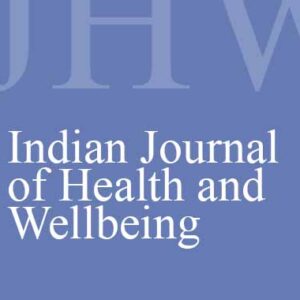
Family care givers educational needs in the care of the home dwelling aged in Ikare-Akoko community of Ondo state, Nigeria
Original price was: ₹ 300.00.₹ 200.00Current price is: ₹ 200.00.
Pages: 388-397
Adeyanju, Awoniyi Babafemi and Beredugo, Letticia Ikiomoye (Department of Community Health Nursing
Faculty of Nursing Sciences, College of Health Sciences, Niger Delta University, Amassoma, Wilberforce Island, Bayelsa State, Nigeria)
Oyedele Emmanuel Adetunji (Department of Nursing, College of Health Sciences, University of Jos, Jos, Plateau State, Nigeria)
Naingba Tunimidei (Department of Community Health Nursing, Faculty of Nursing Sciences, College of Health Sciences, Niger Delta University, Amassoma, Wilberforce Island, Bayelsa State, Nigeria)
Globally, the term family or informal caregiver refers to an unpaid family member, friend, or neighbour who provides care for ill or disabled aged who cannot do for themselves a variety of fundamental tasks due to loss of independence. The purpose of the study was to explore family caregivers’ educational needs in the care of aged in Ikare-Akoko Ondo State, Nigeria. A mixed method research design was adopted and a multistage sampling methods were used to select fifty (50) participants for the quantitative descriptive phase and ten (10) participants for the qualitative explorative phase respectively. An observational check list was used to obtain data in the descriptive quantitative phase while an interview guide was used to guide the interview that helped to elicit qualitative data. The instruments were validated and reliability tested. Data were analysed with the aid of International Business Machine SPSS version 23. Descriptive statistics was done to generate frequencies and percentages of responses from the quantitative data while interview excerpts were subjected to content analysis. Major findings of the study showed that family caregivers’ practical caregiving need is modest. They appreciably performed procedures on medication care, grooming, pain assessment, food preparation and moving patients. However, caregivers demonstrated inadequate skill in performing procedures on emergency resuscitation. The study also revealed that family caregivers perceived caregiving as merely assisting care recipients with ADL and administering medications. they were found to engage in risky practices which can be detrimental to the health of their older relatives, as well as to their own health. More so, family caregivers possess inadequate information about the illness and treatment of care of the aged. They also lack support and have deficient knowledge on where to get external support. Thus there is need for training on care of older relatives at home and how to access help and support from health and social care professionals. In this light, a health education program for family caregivers of aged in Ikare-Akoko could be based on the Melei’s transition theory and should include content such as strategies to care for the aged transition from one life stage to another and to be adequately adapted to new roles among others.
Description
Pages: 388-397
Adeyanju, Awoniyi Babafemi and Beredugo, Letticia Ikiomoye (Department of Community Health Nursing
Faculty of Nursing Sciences, College of Health Sciences, Niger Delta University, Amassoma, Wilberforce Island, Bayelsa State, Nigeria)
Oyedele Emmanuel Adetunji (Department of Nursing, College of Health Sciences, University of Jos, Jos, Plateau State, Nigeria)
Naingba Tunimidei (Department of Community Health Nursing, Faculty of Nursing Sciences, College of Health Sciences, Niger Delta University, Amassoma, Wilberforce Island, Bayelsa State, Nigeria)
Additional information
| Purchase |
|---|
